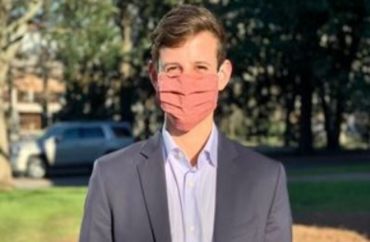
Vanderbilt University’s Equal Opportunity and Access office is investigating formal complaints related to its recent student government election, in which a white, Jewish candidate says he faced cyberbullying and defamation.
Student Jordan Gould published a column in Medium last week headlined “When the Social Justice Mob Came for Me” that described how he was called a “white supremacist and a racist confederate” by peers as he ran for student government president.
“We have received several formal complaints related to the student government election and our Equal Opportunity and Access office is investigating these,” Vanderbilt’s spokesperson Damon Maida told The College Fix via email on Friday.
Maida said that student organizations at Vanderbilt are formed and led by students, and that administrators respect students’ autonomy to create, sustain and lead organizations as part of their college experience.
“[W]e expect all members of these organizations, including student government candidates and representatives, to adhere to high standards of conduct aligned with our commitment to a safe, welcoming and inclusive campus for everyone,” Maida said.
“There were a number of troubling developments related to the most recent student government election and we are working with our students to address these,” he said.
“We will take appropriate action based on the outcomes of the investigations,” Maida said.
The Vanderbilt Student Government Association, which held the election, did not respond to multiple requests from The College Fix for comment sent from a contact submission form via its website.
Gould, who was running for student president, received backlash from some in the Vanderbilt community after the student newspaper the Vanderbilt Hustler reported he was present at his fraternity’s Civil War-themed “North/South week.”
Among the alleged party games was beer pong in which spilled beer was jokingly called spilled blood.
While Gould admitted to being present at the event, he refuted claims by an Instagram account which posted testimony calling the week full of “symbols and rhetoric of racism.” Gould said the suggestion that the event was some sort of ode to the Confederacy is patently false.
“The racism that existed is limited to the name of the event and dividing of teams based on cardinal directions,” Gould said in a message to the Hustler. “The allegations about the event in the AGL post including the presence of a Confederate flag, chants of ‘the South will rise again,’ that the event was a longstanding tradition, or that any member chose a side based on ‘support’ are completely inaccurate and false.”
Members of the Vanderbilt community attacked Gould after evidence of his attendance at North/South week was made public, tearing down his posters and attacking him with death wishes and anti-Semitic comments.
Gould wrote in his Medium column:
The other candidates’ supporters tore down our posters and ripped my head off the pictures, a sinister warning of what was to come. My campaign was called the white supremacist campaign. False social media posts circulated that my fraternity had parties with confederate flags and chanted that the south would rise again. One message said, “White men are the absolute worst!” Soon after, the posts got even more terrifying — “Hitler got something right!” and “he should get dragged for it!” I began to fear for my safety. Why was this happening?
Gould, in his Medium post, wrote that as someone who came from a middle-class Jewish family on a full scholarship, he spent his time on campus working to improve the lives of his peers by serving on the student government’s Economic Inclusivity Committee.
What happened during his campaign brought him into a state of emotional distress, he wrote.
“I felt hopeless. It was a level of fear I couldn’t even process. Everything I had worked for was destroyed, and so was my reputation. I felt like I could never come back from this,” Gould wrote.
Gould ended up withdrawing from the race.
In a since-deleted video he posted on Instagram prior to writing his Medium column, Gould apologized for attending the North/South event and for denying this fact at first to his running mate and the campus community.
He said in the video that act was akin to covering up racism and he should have taken accountability for attending the party, adding he is “not fit” to serve as president and will continue to educate himself.
In the end, Gould wrote in his column, he will continue to serve on the Economic Inclusivity Committee and do what he can to help the lives of others.
Gould’s column has begun making waves at Vanderbilt, and the Hustler published an article culling responses to his column.
“On behalf of the elections commission, I would like to say many of the statements in [Jordan’s article] were blatantly false,” deputy elections commissioner Jordyn Perry told the student newspaper. “It is not true that there was no action taken, and it is not true that I specifically was biased against Jordan and Amisha’s campaign.”
Gould, in his column, had stated Perry was not impartial and “joined the opposition and participated in the vitriolic shaming and blaming. She violated the very rules she was supposed to enforce.”
Hannah Bruns, the student elected president, told the Hustler that while she is focused on her upcoming role, she had concerns with Gould’s piece.
“One of my biggest problems with the article was specifically the title using ‘social justice mob,’” Bruns said. “I think there [are] some deeply problematic things behind referring to a group of black students who are trying to hold you accountable for your past racist actions as a ‘mob.’”
MORE: UCLA student told she could not serve – because she is Jewish
IMAGE: Instagram screenshot
Like The College Fix on Facebook / Follow us on Twitter






Please join the conversation about our stories on Facebook, Twitter, Instagram, Reddit, MeWe, Rumble, Gab, Minds and Gettr.